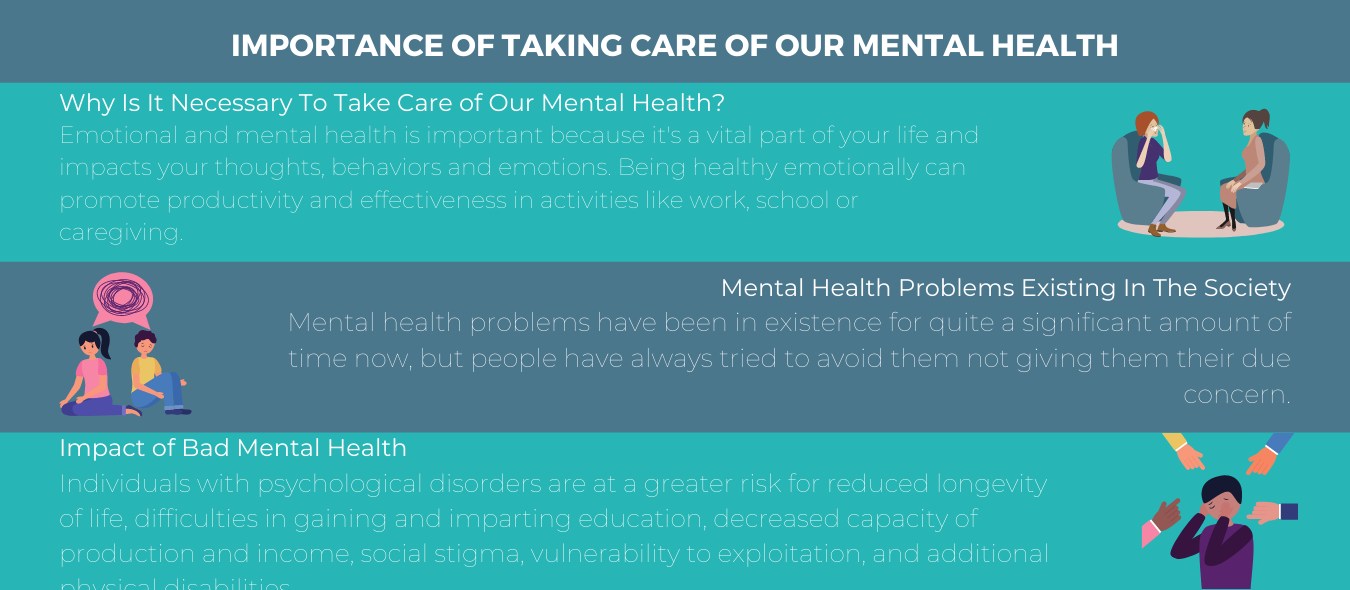Mental health relates to an individual’s state of mind. It concerns his/ her psychological and emotional well-being. If he/she understands his or her abilities, can cope with the regular pressures of life, can work productively, and can provide to his or her society, he/ she is in a good state of mind, or we can say he/she is mentally fit.
Now that we have established the basic definition of mental health let us mull over its importance.
Why Is It Necessary To Take Care of Our Mental Health?
Out of all the essentials that are required for leading a happy life, mental well-being tops the list. Imagine having lots of money, good friends, and a loving family, but still, your mind is not at peace. Something deep in your heart is hunting down your happiness. Mankind generally focuses more on physical health and outward appearance and tends to give a backseat to mental fitness. Man’s superiority over other living organisms lies in the supremacy of his brain. Had man’s brain not been so highly developed, society would still have been struggling for even the basic comforts of life. Appropriate mental health is necessary for the smooth passage of every stage of life – from childhood to teenage to adulthood. There is no bar concerning age, gender, caste, region, and religion when it comes to mental health problems. Such issues can be experienced by any individual at any point in life. According to a study conducted by American Magellan Health Insights, one in every five American adults experience a period of major depression.
Mental Health Problems Existing In The Society
Mental health problems have been in existence for quite a significant amount of time now, but people have always tried to avoid them not giving them their due concern. Mental sickness has become an alarming issue in the 21st century. In a report by WHO, it has been stated that depression, by 2020, will be the second most heavily burdened cause of illness. Thus, it is no longer confined to the boundaries of a particular region or nation. Like every other modern phenomenon, it has spread to even the remotest places on the world map. There can be many reasons which could potentially result in poor mental health. Some of them are- childhood abuse, trauma, neglect, social isolation or loneliness, bereavement, continued stress, social disadvantage, poverty, debt, poor physical health, alcohol, drug abuse, etc. It could also arise from genetic factors and biochemical imbalances.
Impact of Bad Mental Health
Mental disorder though being a personal issue has its far-reaching impact not only on the said patient but his family/caregivers and the society in which he lives. Individuals with psychological disorders are at a greater risk for reduced longevity of life, difficulties in gaining and imparting education, decreased capacity of production and income, social stigma, vulnerability to exploitation, and additional physical disabilities. Education is often hindered, resulting in high dropout rates and lowered overall academic achievement. Mental illness has a “trickle-down” effect on families and friends, making it stressful for them to care for a mentally ill individual them and also rendering them unable to work at full capacity, leading to decreased economic output and a reduction in household income, which further leads to financial debt and increased poverty. They may also suffer from prolonged and chronic stress while providing physical and emotional care to the patient. These responsibilities create an additional burden upon the family members.
Mental illness also leaves a great impact on the society and the economy involved.
What Science Says
Many health scholars and experts have said that overall fitness is a combination of physical, mental, and social health. Not everyone suffering receives timely and proper help and medication which worsens the situation. People are still hesitant in accepting a mental disorder because of the social stigma attached to it, and they even consider it a taboo. They feel shame in accepting it in front of the world and in seeking help from the doctors. To change the perception of people regarding mental illness and spread awareness about the same, United Nations has declared 10th October as World Mental Health Day. Many countries and leading health organizations have introduced programs that help in promoting mental health awareness and supporting the already suffering population. For instance, in the year 1982, the government of India launched the NMH Program, i.e., National Mental Health Program, to reduce the burden of mental illness from the society and to engage in capacity building programs so that they could provide a better infrastructure in the country to deal with the problem.
Conclusion
The key to a healthy and successful life is to have an optimum balance between physical and emotional stability. People should give utmost importance to keep the mind healthy like the way physical body is kept.









